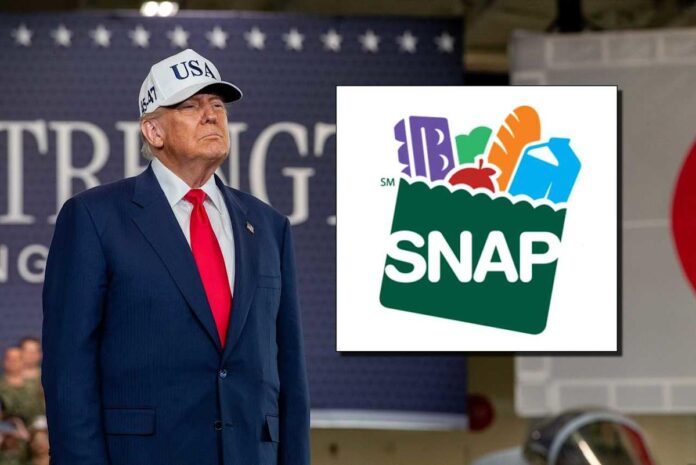The Trump administration is asking a federal appeals court to halt a Rhode Island judge’s order that requires the U.S. Department of Agriculture (USDA) to fully fund food stamp benefits for tens of millions of Americans this month.
The emergency motion was filed Friday morning with the First Circuit Court of Appeals, just one day after U.S. District Judge John McConnell ruled that the administration must “find additional money” to ensure full November benefits under the Supplemental Nutrition Assistance Program (SNAP) are distributed to all recipients.
Judge McConnell’s order directly rejected the USDA’s plan to provide only partial payments due to the ongoing federal budget impasse. In his decision, he emphasized that the government cannot suspend a legally mandated nutrition program simply because Congress has not finalized appropriations.
DOJ Argues the Court “Overstepped”
Attorneys for the Justice Department, representing the USDA, blasted the judge’s ruling in their filing to the Boston-based appeals court, claiming McConnell had “thrust the Judiciary into the ongoing shutdown negotiations” and “overstepped his authority” by ordering the agency to locate the missing $4 billion needed to fully fund benefits.
“This unprecedented injunction makes a mockery of the separation of powers,” DOJ attorneys wrote. “Courts hold neither the power to appropriate nor the power to spend. There is no lawful basis for an order that directs USDA to somehow find $4 billion in the metaphorical couch cushions.”
The administration is asking the appeals court to intervene by 4 p.m. Eastern today, hoping to pause McConnell’s order before the USDA’s funding deadline expires.
Nearly 42 Million Americans Impacted
SNAP, the nation’s largest food assistance program, supports roughly 42 million low-income Americans, including children, veterans, seniors, and people with disabilities. States administer the program on staggered schedules throughout each month.
After last week’s partial funding order, states began processing reduced payments—but many recipients were told they could face weeks-long delays. Illinois officials said they plan to distribute funds Friday to those who were scheduled earlier in the month, while others would receive benefits later on.
A Legal and Political Flashpoint
The dispute has quickly become a flashpoint in the broader government shutdown negotiations, with food security advocates accusing the administration of weaponizing essential benefits during a political standoff.
The coalition of cities, nonprofits, unions, and small businesses that brought the lawsuit argued the USDA had the authority under existing law to access emergency contingency funds—an argument supported by the court. The appeals court has now asked that same coalition to respond to the administration’s request by noon Friday.
If the First Circuit upholds McConnell’s order, the administration will be required to issue full payments by the end of the day. If the appeals court grants the pause, tens of millions of households could see reduced or delayed food assistance heading into the holidays.
Background
This latest legal battle follows several conflicting directives from the USDA over the past two weeks. Initially, the department claimed it lacked sufficient appropriations authority to fully fund SNAP during the shutdown, but court filings and internal memos revealed the agency had previously used emergency funding measures under similar circumstances in the past.
The ongoing litigation highlights both the immediate human toll of government gridlock and the growing tension between executive authority and judicial oversight in managing essential federal programs during shutdowns.











